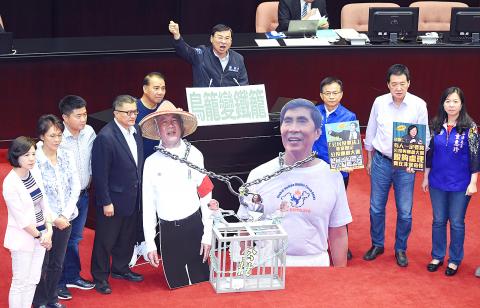Lawmakers yesterday passed an amendment to the Referendum Act (公民投票法) to decouple referendums from national elections.
The amended act stipulates that referendums are to be held on the fourth Saturday of August once every two years, starting in 2021.
The amendment was passed after lawmakers earlier in the day approved a proposal by Democratic Progressive Party (DPP) caucus whip Ker Chien-ming (柯建銘) and 66 others to hold a provisional session from yesterday through July 5 to review proposed amendments and laws.

Photo: Liao Chen-huei, Taipei Times
A procedural committee meeting was held at noon, followed by the first plenary session in the afternoon.
Plenary sessions are to be held today and tomorrow, with a second round of sessions to be held on Thursday, Friday and Thursday next week.
A third round is to be held on Friday next week and from July 1 to 5.
DPP lawmakers, who hold the legislative majority, ensured that voting at the committee meeting gave priority to dealing with proposed changes to the Referendum Act, the National Security Act (國家安全法), the Act for Industrial Innovation (產業創新條例), the Agricultural Products Market Transaction Act (農產品市場交易法) and the Food Administration Act (糧食管理法).
Chinese Nationalist Party (KMT) caucus secretary-general John Wu (吳志揚) had previously condemned the referendum bill’s advancement to the legislative floor after the DPP caucus on May 17 sent the proposal by DPP Legislator Chiang Chieh-an (蔣絜安) to a second reading without undergoing a committee review.
KMT lawmakers were holding a news conference on same-sex marriage bills at the time.
Chiang’s version included a clause that would have required people to present photocopies of their national ID cards when signing referendum petitions.
The requirement has faced opposition from several sectors of society, including the KMT, which has said it would be contravene democratic principles.
The DPP caucus had argued that the requirement would prevent bogus signatures and the names of dead people being used.
However, it agreed to remove the clause and said it would ask the Central Election Commission to deal with the issue of fake signatures, Ker said.
The commission should set up systems to identify and remove fake signatures, and to collect electronic signatures, he added.
Decoupling the referendums from national elections would help prevent a recurrence of long lines, slow voting and delayed results that occurred during the Nov. 24 elections last year, when 10 referendums were held alongside local elections, Ker said.

SECURITY: As China is ‘reshaping’ Hong Kong’s population, Taiwan must raise the eligibility threshold for applications from Hong Kongers, Chiu Chui-cheng said When Hong Kong and Macau citizens apply for residency in Taiwan, it would be under a new category that includes a “national security observation period,” Mainland Affairs Council (MAC) Minister Chiu Chui-cheng (邱垂正) said yesterday. President William Lai (賴清德) on March 13 announced 17 strategies to counter China’s aggression toward Taiwan, including incorporating national security considerations into the review process for residency applications from Hong Kong and Macau citizens. The situation in Hong Kong is constantly changing, Chiu said to media yesterday on the sidelines of the Taipei Technology Run hosted by the Taipei Neihu Technology Park Development Association. With

A US Marine Corps regiment equipped with Naval Strike Missiles (NSM) is set to participate in the upcoming Balikatan 25 exercise in the Luzon Strait, marking the system’s first-ever deployment in the Philippines. US and Philippine officials have separately confirmed that the Navy Marine Expeditionary Ship Interdiction System (NMESIS) — the mobile launch platform for the Naval Strike Missile — would take part in the joint exercise. The missiles are being deployed to “a strategic first island chain chokepoint” in the waters between Taiwan proper and the Philippines, US-based Naval News reported. “The Luzon Strait and Bashi Channel represent a critical access

CARROT AND STICK: While unrelenting in its military threats, China attracted nearly 40,000 Taiwanese to over 400 business events last year Nearly 40,000 Taiwanese last year joined industry events in China, such as conferences and trade fairs, supported by the Chinese government, a study showed yesterday, as Beijing ramps up a charm offensive toward Taipei alongside military pressure. China has long taken a carrot-and-stick approach to Taiwan, threatening it with the prospect of military action while reaching out to those it believes are amenable to Beijing’s point of view. Taiwanese security officials are wary of what they see as Beijing’s influence campaigns to sway public opinion after Taipei and Beijing gradually resumed travel links halted by the COVID-19 pandemic, but the scale of

Pope Francis is be laid to rest on Saturday after lying in state for three days in St Peter’s Basilica, where the faithful are expected to flock to pay their respects to history’s first Latin American pontiff. The cardinals met yesterday in the Vatican’s synod hall to chart the next steps before a conclave begins to choose Francis’ successor, as condolences poured in from around the world. According to current norms, the conclave must begin between May 5 and 10. The cardinals set the funeral for Saturday at 10am in St Peter’s Square, to be celebrated by the dean of the College